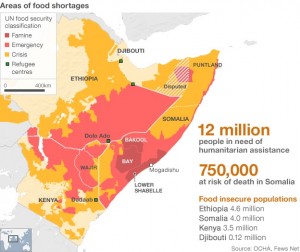
From a BBC news article:
Three months after famine was declared in Somalia, the scale of the crisis in the Horn of Africa remains huge, says a British official.
International Development Secretary Andrew Mitchell said hundreds of people, mainly children, were dying every day.
The coming rainy season is expected to bring disease to crowded refugee camps.
In Somalia alone, Mr Mitchell points out, more than 400,000 children remain at risk of death.
While the rains can bring more misery and death in their wake, they can of course be part of the recovery from this disaster too.
What I find puzzling is the title of the article: “East Africa Drought ‘Remains Huge Crisis’.”
Sure enough, the drought in East Africa is the worst in over 50 years. But to blame it for the famine is a huge stretch. After all, many other areas of the world have experienced drought in the past without then experiencing famine.
More convincingly, why is it that Somalia is experiencing famine, but that Kenya and Ethiopia are not? The different institutions on either side of the Kenya-Somalia and the Ethiopia-Somalia borders make for a nice social experiment and point to the idea that famines are man-made.
In other words, while natural disasters can certainly cause food shortages, it really looks as though bad institutions — the lack of government accountability in most cases — are really the root cause of famine.
For more on the current famine in the Horn of Africa and its human causes, I encourage readers to listen to this excellent podcast.
Seven Billion People on Earth: Enough with the Fear Mongering
The seven billionth person on Earth will be born today according to the United Nations. To mark occasion, the BBC has developed an application that allows calculating your own number. I learned that, of all the people now alive, I was born 4,133,669,462nd.
As is inevitably the case when talking about the world’s population, the birth of the seven billionth person has caused a rash of newspaper articles, newscasts, and blog posts about how this really is a sign that at least two of the Four Horsemen of the Apocalypse — famine and death — will soon be here.
For a perfect example of that type of fear mongering, see this presentation, by Australian journalist Julian Cribb.
The Reverend’s New(est) Clothes
But really, Cribb is merely serving us the reheated leftovers of Reverend Thomas Malthus‘ Essay on the Principle of Population. In this book, first published in 1798, Malthus asserted that disease and famine would naturally arise to limit the size of any population.
Thus, because population growth would outpace agricultural growth (after all, there is only a limited amount of arable land in the world), disease and famine would take care of keeping the size of the population in check. Malthus actually estimated that the upper bound was equal to about one billion.